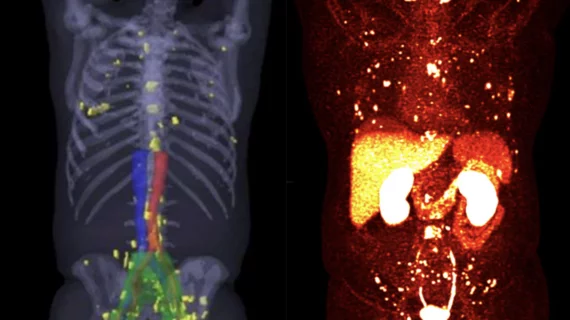PSMA-PET a more cost-effective option for patients long-term compared to standard prostate imaging
Prostate specific membrane antigen (PSMA) positron emission tomography (PET) is being utilized in many practices as a new standard of care for prostate cancer staging, but some have questioned whether this is the most cost-effective approach.
Experts recently compared expenses associated with F-18 DCFPyL PSMA-PET/CT to standard imaging protocols for prostate cancer staging that include multiparametric MRI of the prostate, CT of the chest, abdomen, and pelvis, as well as whole-body bone scintigraphy. They found that although F-18 DCFPyL PSMA-PET/CT initially costs more than conventional imaging, its superior sensitivity for detecting small lesions in earlier stages of development make it a more cost-effective option in the long-term because of its impact on disease management.
“PSMA PET/CT independently can save time and act as a decision-making aid for the patient, potentially improving delivery of appropriate care for men with PC,” study leader Kritika Subramanian, of the Division of Molecular Imaging and Therapeutics at Weill Cornell Medicine in New York City, and colleagues noted.
For their analysis, the team reviewed the cases of prostate cancer patients who underwent a PSMA PET/CT scan (either [68Ga]Ga-PSMA-11 or [18F]DCFPyL) between January 2018 and December 2021. This yielded a total of 564 patients.
F-18 DCFPyL PET/CT was associated with the greatest upfront expenses, costing approximately $25,201 per person; F-18 fluciclovine PET/CT was next in line, costing $18,000 per person and conventional imaging followed close behind at $17,176 per person.
Since F-18 DCFPyL PET/CT is more likely to detect smaller cancers sooner, it eliminates the need for additional imaging and better informs therapy, the authors noted. They added that this also increases patients’ quality-adjusted life years. In the long-term, this equates to lower overall costs than patients would incur if they required multiple scans and rounds of treatment.
The findings support adopting F-18 DCFPyL PET/CT as the standard of care for prostate cancer staging, the authors suggested.
The study abstract is available in Scientific Reports.

